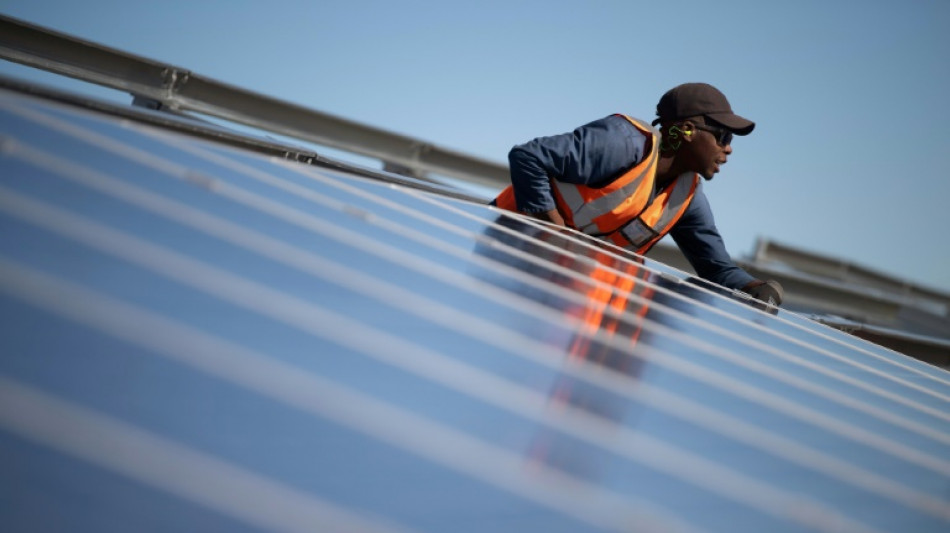
CMSC
0.0300


The hosts of the most recent UN climate talks are worried international lenders are retreating from their commitments to help boost funding for developing countries' response to global warming.
Major development banks have agreed to boost climate spending and are seen as crucial in the effort to dramatically increase finance to help poorer countries build resilience to impacts and invest in renewable energy.
But anxiety has grown as the Trump administration has slashed foreign aid and discouraged US-based development lenders such as the World Bank and the International Monetary Fund from focussing on climate finance.
Developing nations, excluding China, will need an estimated $1.3 trillion a year by 2035 in financial assistance to transition to renewable energy and climate-proof their economies from increasing weather extremes.
Nowhere near this amount has been committed.
At last year's UN COP29 summit in Azerbaijan, rich nations agreed to increase climate finance to $300 billion a year by 2035, an amount decried as woefully inadequate.
Azerbaijan and Brazil, which is hosting this year's COP30 conference, have launched an initiative to reduce the shortfall, with the expectation of "significant" contributions from international lenders.
But so far only two -- the African Development Bank and the Inter-American Development Bank -- have responded to a call to engage the initiative with ideas, said COP29 president Mukhtar Babayev.
"We call on their shareholders to urgently help us to address these concerns," he told climate negotiators at a high-level summit in the German city of Bonn this week.
"We fear that a complex and volatile global environment is distracting" many of those expected to play a big role in bridging the climate finance gap, he added.
- A 'worrisome trend' -
His team travelled to Washington in April for the IMF and World Bank's spring meetings hoping to find the same enthusiasm for climate lending they had encountered a year earlier.
But instead they found institutions "very much reluctant now to talk about climate at all", said Azerbaijan's top climate negotiator Yalchin Rafiyev.
This was a "worrisome trend", he said, given expectations these lenders would extend the finance needed in the absence of other sources.
"They're very much needed," he said.
The World Bank is directing 45 percent of its total lending to climate, as part of an action plan in place until June 2026, with the public portion of that spilt 50/50 between emissions reductions and building resilience.
The United States, the World Bank's biggest shareholder, has pushed in a different direction.
On the sidelines of the April spring meetings, US Treasury Secretary Scott Bessent urged the bank to focus on "dependable technologies" rather than "distortionary climate finance targets."
This could mean investing in gas and other fossil fuel-based energy production, he said.
Under the Paris Agreement, wealthy developed countries -- those most responsible for global warming to date -- are obliged to pay climate finance to poorer nations.
Other countries, most notably China, make voluntary contributions.
- Money matters -
Finance is a source of long-running tensions at UN climate negotiations.
Donors have consistently failed to deliver on past finance pledges, and have committed well below what experts agree developing nations need to cope with the climate crisis.
The issue flared up again this week in Bonn, with nations at odds over whether to debate financial commitments from rich countries during the formal meetings.
European nations have also pared back their foreign aid spending in recent months, raising fears that budgets for climate finance could also face a haircut.
At COP29, multilateral development banks (MDBs) led by the World Bank Group estimated they could provide $120 billion annually in climate financing to low and middle income countries, and mobilise another $65 billion from the private sector by 2030.
Their estimate for high income countries was $50 billion, with another $65 billion mobilised from the private sector.
Rob Moore, of policy think tank E3G, said these lenders are the largest providers of international public finance to developing countries.
"Whilst they are facing difficult political headwinds in some quarters, they would be doing both themselves and their clients a disservice by disengaging on climate change," he said.
The World Bank in particular has done "a huge amount of work" to align its lending with global climate goals.
"If they choose to step back this would be at their own detriment, and other banks like the regionally based MDBs would likely play a bigger role in shaping the economy of the future," he said.
The World Bank declined to comment on the record.
A.Zhang--ThChM